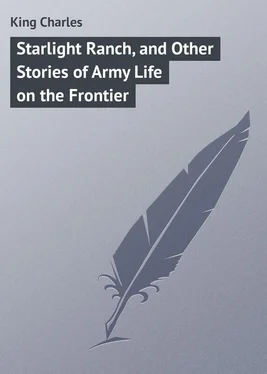Charles King - Starlight Ranch, and Other Stories of Army Life on the Frontier
Здесь есть возможность читать онлайн «Charles King - Starlight Ranch, and Other Stories of Army Life on the Frontier» — ознакомительный отрывок электронной книги совершенно бесплатно, а после прочтения отрывка купить полную версию. В некоторых случаях можно слушать аудио, скачать через торрент в формате fb2 и присутствует краткое содержание. Жанр: foreign_adventure, foreign_prose, foreign_language, на английском языке. Описание произведения, (предисловие) а так же отзывы посетителей доступны на портале библиотеки ЛибКат.
- Название:Starlight Ranch, and Other Stories of Army Life on the Frontier
- Автор:
- Жанр:
- Год:неизвестен
- ISBN:нет данных
- Рейтинг книги:3 / 5. Голосов: 1
-
Избранное:Добавить в избранное
- Отзывы:
-
Ваша оценка:
- 60
- 1
- 2
- 3
- 4
- 5
Starlight Ranch, and Other Stories of Army Life on the Frontier: краткое содержание, описание и аннотация
Предлагаем к чтению аннотацию, описание, краткое содержание или предисловие (зависит от того, что написал сам автор книги «Starlight Ranch, and Other Stories of Army Life on the Frontier»). Если вы не нашли необходимую информацию о книге — напишите в комментариях, мы постараемся отыскать её.
Starlight Ranch, and Other Stories of Army Life on the Frontier — читать онлайн ознакомительный отрывок
Ниже представлен текст книги, разбитый по страницам. Система сохранения места последней прочитанной страницы, позволяет с удобством читать онлайн бесплатно книгу «Starlight Ranch, and Other Stories of Army Life on the Frontier», без необходимости каждый раз заново искать на чём Вы остановились. Поставьте закладку, и сможете в любой момент перейти на страницу, на которой закончили чтение.
Интервал:
Закладка:
King Charles
Starlight Ranch, and Other Stories of Army Life on the Frontier
STARLIGHT RANCH
We were crouching round the bivouac fire, for the night was chill, and we were yet high up along the summit of the great range. We had been scouting through the mountains for ten days, steadily working southward, and, though far from our own station, our supplies were abundant, and it was our leader's purpose to make a clean sweep of the line from old Sandy to the Salado, and fully settle the question as to whether the renegade Apaches had betaken themselves, as was possible, to the heights of the Matitzal, or had made a break for their old haunts in the Tonto Basin or along the foot-hills of the Black Mesa to the east. Strong scouting-parties had gone thitherward, too, for "the Chief" was bound to bring these Tontos to terms; but our orders were explicit: "Thoroughly scout the east face of the Matitzal." We had capital Indian allies with us. Their eyes were keen, their legs tireless, and there had been bad blood between them and the tribe now broken away from the reservation. They asked nothing better than a chance to shoot and kill them; so we could feel well assured that if "Tonto sign" appeared anywhere along our path it would instantly be reported. But now we were south of the confluence of Tonto Creek and the Wild Rye, and our scouts declared that beyond that point was the territory of the White Mountain Apaches, where we would not be likely to find the renegades.
East of us, as we lay there in the sheltered nook whence the glare of our fire could not be seen, lay the deep valley of the Tonto brawling along its rocky bed on the way to join the Salado, a few short marches farther south. Beyond it, though we could not see them now, the peaks and "buttes" of the Sierra Ancha rolled up as massive foot-hills to the Mogollon. All through there our scouting-parties had hitherto been able to find Indians whenever they really wanted to. There were some officers who couldn't find the Creek itself if they thought Apaches lurked along its bank, and of such, some of us thought, was our leader.
In the dim twilight only a while before I had heard our chief packer exchanging confidences with one of the sergeants, —
"I tell you, Harry, if the old man were trying to steer clear of all possibility of finding these Tontos, he couldn't have followed a better track than ours has been. And he made it, too; did you notice? Every time the scouts tried to work out to the left he would herd them all back – up-hill."
"We never did think the lieutenant had any too much sand," answered the sergeant, grimly; "but any man with half an eye can see that orders to thoroughly scout the east face of a range does not mean keep on top of it as we've been doing. Why, in two more marches we'll be beyond their stamping-ground entirely, and then it's only a slide down the west face to bring us to those ranches in the Sandy Valley. Ever seen them?"
"No. I've never been this far down; but what do you want to bet that that's what the lieutenant is aiming at? He wants to get a look at that pretty girl all the fellows at Fort Phoenix are talking about."
"Dam'd old gray-haired rip! It would be just like him. With a wife and kids up at Sandy too."
There were officers in the party, junior in years of life and years of service to the gray-headed subaltern whom some odd fate had assigned to the command of this detachment, nearly two complete "troops" of cavalry with a pack-train of sturdy little mules to match. We all knew that, as organized, one of our favorite captains had been assigned the command, and that between "the Chief," as we called our general, and him a perfect understanding existed as to just how thorough and searching this scout should be. The general himself came down to Sandy to superintend the start of the various commands, and rode away after a long interview with our good old colonel, and after seeing the two parties destined for the Black Mesa and the Tonto Basin well on their way. We were to move at nightfall the following day, and within an hour of the time of starting a courier rode in from Prescott with despatches (it was before our military telegraph line was built), and the commander of the division – the superior of our Arizona chief – ordered Captain Tanner to repair at once to San Francisco as witness before an important court-martial. A groan went up from more than one of us when we heard the news, for it meant nothing less than that the command of the most important expedition of all would now devolve upon the senior first lieutenant, Gleason; and so much did it worry Mr. Blake, his junior by several files, that he went at once to Colonel Pelham, and begged to be relieved from duty with that column and ordered to overtake one of the others. The colonel, of course, would listen to nothing of the kind, and to Gleason's immense and evident gratification we were marched forth under his command. There had been no friction, however. Despite his gray beard, Gleason was not an old man, and he really strove to be courteous and conciliatory to his officers, – he was always considerate towards his men; but by the time we had been out ten days, having accomplished nothing, most of us were thoroughly disgusted. Some few ventured to remonstrate. Angry words passed between the commander and Mr. Blake, and on the night on which our story begins there was throughout the command a feeling that we were simply being trifled with.
The chat between our chief packer and Sergeant Merrick ceased instantly as I came forward and passed them on the way to look over the herd guard of the little battalion, but it set me to thinking. This was not the first that the officers of the Sandy garrison had heard of those two new "ranches" established within the year down in the hot but fertile valley, and not more than four hours' easy gallop from Fort Phoenix, where a couple of troops of "Ours" were stationed. The people who had so confidently planted themselves there were evidently well to do, and they brought with them a good-sized retinue of ranch- and herdsmen, – mainly Mexicans, – plenty of "stock," and a complete "camp outfit," which served them well until they could raise the adobe walls and finish their homesteads. Curiosity led occasional parties of officers or enlisted men to spend a day in saddle and thus to visit these enterprising neighbors. Such parties were always civilly received, invited to dismount, and soon to take a bite of luncheon with the proprietors, while their horses were promptly led away, unsaddled, rubbed down, and at the proper time fed and watered. The officers, of course, had introduced themselves and proffered the hospitality and assistance of the fort. The proprietors had expressed all proper appreciation, and declared that if anything should happen to be needed they would be sure to call; but they were too busy, they explained, to make social visits. They were hard at work, as the gentlemen could see, getting up their houses and their corrals, for, as one of them expressed it, "We've come to stay." There were three of these pioneers; two of them, brothers evidently, gave the name of Crocker. The third, a tall, swarthy, all-over-frontiersman, was introduced by the others as Mr. Burnham. Subsequent investigations led to the fact that Burnham was first cousin to the Crockers. "Been long in Arizona?" had been asked, and the elder Crocker promptly replied, "No, only a year, – mostly prospecting."
The Crockers were building down towards the stream; but Burnham, from some freak which he did not explain, had driven his stakes and was slowly getting up his walls half a mile south of the other homestead, and high up on a spur of foot-hill that stood at least three hundred feet above the general level of the valley. From his "coigne of vantage" the whitewashed walls and the bright colors of the flag of the fort could be dimly made out, – twenty odd miles down stream.
Читать дальшеИнтервал:
Закладка:
Похожие книги на «Starlight Ranch, and Other Stories of Army Life on the Frontier»
Представляем Вашему вниманию похожие книги на «Starlight Ranch, and Other Stories of Army Life on the Frontier» списком для выбора. Мы отобрали схожую по названию и смыслу литературу в надежде предоставить читателям больше вариантов отыскать новые, интересные, ещё непрочитанные произведения.
Обсуждение, отзывы о книге «Starlight Ranch, and Other Stories of Army Life on the Frontier» и просто собственные мнения читателей. Оставьте ваши комментарии, напишите, что Вы думаете о произведении, его смысле или главных героях. Укажите что конкретно понравилось, а что нет, и почему Вы так считаете.












